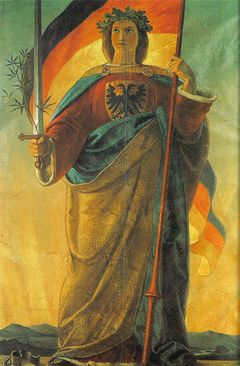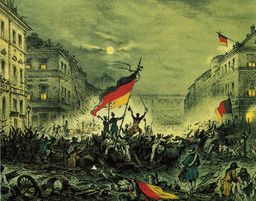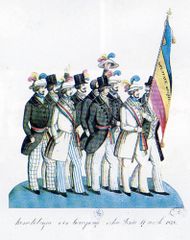ثورات 1848
ثورات 1848 ثورة بدأت في فرنسا احتجاجًا على قيود الانتخابات والفساد السياسي والظروف الاقتصادية السيئة. ثم سرعان ما شهدت هذه الثورة تحركات سياسية في كل من ألمانيا والإمبراطورية النمساوية وأجزاء من إيطاليا. وكان من أسبابها المطالبة بحكومة دستورية، وازدياد الشعور بالقومية لدى الألمان والإيطاليين والمجريين والتشيكيين، بالإضافة إلى معارضة المزارعين للنظام الإقطاعي، في بعض أجزاء ألمانيا والإمبراطورية النمساوية. انظر: الإقطاع الأوروبي.
بدأت الثورة في فرنسا في فبراير عام 1848م، احتجاجًا على القيود على الانتخابات والفساد السياسي والظروف الاقتصادية السيئة. وعلى إِثْر ذلك تنازل الملك لويس فيليب عن العرش، وأقام السياسيّون الأحرار حكومة جديدة، أطلقوا عليها اسم الجمهورية الثانية.
وامتدت الثورة إلى الإمبراطورية النمساوية وألمانيا بشكلٍ سريع. فقد تظاهر الطلبة والعمال في فيينّا. كما ثار الوطنيون التشيك والمجريون ضد السلطة النمساوية، وكذلك حاول الإيطاليون طرد الحكام النمساويين من شمالي إيطاليا. وفي ألمانيا اجتاحت الحركات السياسية جميع أنحاء الاتحاد الألماني المكوَّن من بروسيا و38 مقاطعة أخرى مستقلة. فقد طالب العمال في ألمانيا بالإصلاحات الاجتماعية، واجتمع ممثلو الأحزاب المختلفة في مدينة فرانكفورت، لمحاولة توحيد المقاطعات المنفصلة.
. . . . . . . . . . . . . . . . . . . . . . . . . . . . . . . . . . . . . . . . . . . . . . . . . . . . . . . . . . . . . . . . . . . . . . . . . . . . . . . . . . . . . . . . . . . . . . . . . . . . . . . . . . . . . . . . . . . . . . . . . . . . . . . . . . . . . . . . . . . . . . . . . . . . . . . . . . . . . . . . . . . . . . . .
المناطق الريفية
الثورات
الدويلات الإيطالية
فرنسا
 مقالة مفصلة: الثورة الفرنسية 1848
مقالة مفصلة: الثورة الفرنسية 1848
The "February Revolution" in France was sparked by the suppression of the campagne des banquets. It ended the constitutional monarchy of Louis-Philippe, and led to the creation of the French Second Republic.
الدويلات الألمانية
"ثورة مارس" في الدويلات الألمانية نشبت في جنوب وغرب ألمانيا، بتجمعات جماهيرية حاشدة ومظاهرات عارمة. وكانوا يطالبون في الأساس بالتالي: الوحدة القومية الألمانية، حرية الصحافة وحرية التجمع وتسليح الشعب وإنشاء برلمان ألماني.
شلسڤيگ
Schleswig, a region containing both Danes and Germans, was a part of the Danish monarchy but remained a duchy separate from the Kingdom of Denmark. The Germans of Schleswig took up arms to protest a new policy announced by Denmark's National Liberal government, which would have fully integrated the duchy into Denmark. Prussia intervened in the revolt, causing the ensuing war to last for three years. The result was a return to the status quo.
امبراطورية هابسبورگ
From March 1848 through July 1849, the Habsburg Austrian Empire was threatened by revolutionary movements, which often had a nationalist character. The empire, ruled from Vienna, included Austrian Germans, Hungarians, Slovenes, Poles, Czechs, Slovaks, Ruthenians, Romanians, Serbs, Italians, and Croats, all of whom attempted in the course of the revolution to either achieve autonomy, independence, or even hegemony over other nationalities. The nationalist picture was further complicated by the simultaneous events in the German states, which moved toward greater German national unity.
المجر
On March 15, 1848, mass demonstrations in Pest and Buda forced the imperial governor to accept all demands. This unrest was followed by various insurrections throughout the kingdom, which enabled Hungarian reformists to declare Hungary's autonomy within the Habsburg Empire. The revolution in Hungary grew into a war for independence, which was suppressed in August, 1849.
سويسرة
Switzerland, already an alliance of republics, also saw major internal struggle. The creation of the Sonderbund led to a short Swiss civil war in November 1847. In 1848, a new constitution ended the almost-complete independence of the cantons and transformed Switzerland into a federal state. helllo welcome to im a nerd hello ur a nerd
بولندا الكبرى
Polish people mounted a military insurrection in the Grand Duchy of Poznań (or the Greater Poland region) against the occupying Prussian forces.
ولاخيا
A Romanian liberal and Romantic nationalist uprising began in June in the principality of Wallachia. Closely connected with the 1848 unsuccessful revolution in Moldavia, it sought to overturn the administration imposed by Imperial Russian authorities under the Regulamentul Organic regime, and, through many of its leaders, demanded the abolition of boyar privilege. Led by a group of young intellectuals and officers in the Wallachian military forces, the movement succeeded in toppling the ruling Prince Gheorghe Bibescu, whom it replaced with a Provisional Government and a Regency, and in passing a series of major progressive reforms, first announced in the Proclamation of Islaz.
البرازيل
في البرازيل, the "Praieira revolt" was a movement in Pernambuco that lasted from November 1848 to 1852. Unresolved conflicts left over from the period of the Regency and local resistance to the consolidation of the Brazilian Empire that had been proclaimed in 1822 helped to plant the seeds of the revolution.
. . . . . . . . . . . . . . . . . . . . . . . . . . . . . . . . . . . . . . . . . . . . . . . . . . . . . . . . . . . . . . . . . . . . . . . . . . . . . . . . . . . . . . . . . . . . . . . . . . . . . . . . . . . . . . . . . . . . . . . . . . . . . . . . . . . . . . . . . . . . . . . . . . . . . . . . . . . . . . . . . . . . . . . .
سري لانكا
 مقالة مفصلة: تمرد ماتاله
مقالة مفصلة: تمرد ماتاله
الذكرى
- . . . We have been beaten and humiliated . . . scattered, imprisoned, disarmed and gagged. The fate of European democracy has slipped from our hands. Pierre Joseph Proudhon[1]
In the post-revolutionary decade after 1848, little had visibly changed, and some historians consider the revolutions a failure, given the seeming lack of permanent structural changes.
فَشلت ثورة عام 1848م بعد وقت قصير على قيامها. ففي فرنسا أعلن لويس نابليون بونابرت ـ الذي تم اختياره رئيسًا للبلاد ـ تنصيب نفسه إمبراطورًا، وتم إخماد حركة الاحتجاج العامة. وفي الإمبراطورية النمساوية، سحق الجنود مظاهرات الوطنيين، وهُزم الثوار الإيطاليون. أما في ألمانيا فقد سادت الملكية معظم المقاطعات الألمانية، وفشِل تجمُّع الأحزاب في فرانكفورت في توحيد ألمانيا.
ومع ذلك فقد تم إنجاز هدف واحد للثورة ـ وهو إلغاء النظام الإقطاعي في ألمانيا والإمبراطورية النمساوية ـ كما أصبح الحكام الأوروبيون أكثر تجاوبًا مع مطالب المواطنين، وبدأوا بمحاولة تشكيل حكومات تتمتع بحرية أكثر.
انظر أيضاً
| جزء من سلسلة عن |
| الديمقراطية الاشتراكية |
|---|
 |
|
</noinclude>
المصادر
- ^ Breunig, Charles (1977), The Age of Revolution and Reaction, 1789 - 1850 (ISBN 0-393-09143-0)
ببليوجرافيا
- Breunig, Charles (1977), The Age of Revolution and Reaction, 1789 - 1850 (ISBN 0-393-09143-0)
- Jones, Peter (1981), The 1848 Revolutions (Seminar Studies in History) (ISBN 0-582-06106-7)
- Rapport, Mike (2009), 1848: Year of Revolution (ISBN 978-0465014361)
- Robertson, Priscilla (1952), Revolutions of 1848: A Social History (ISBN 0-691-00756-X)



